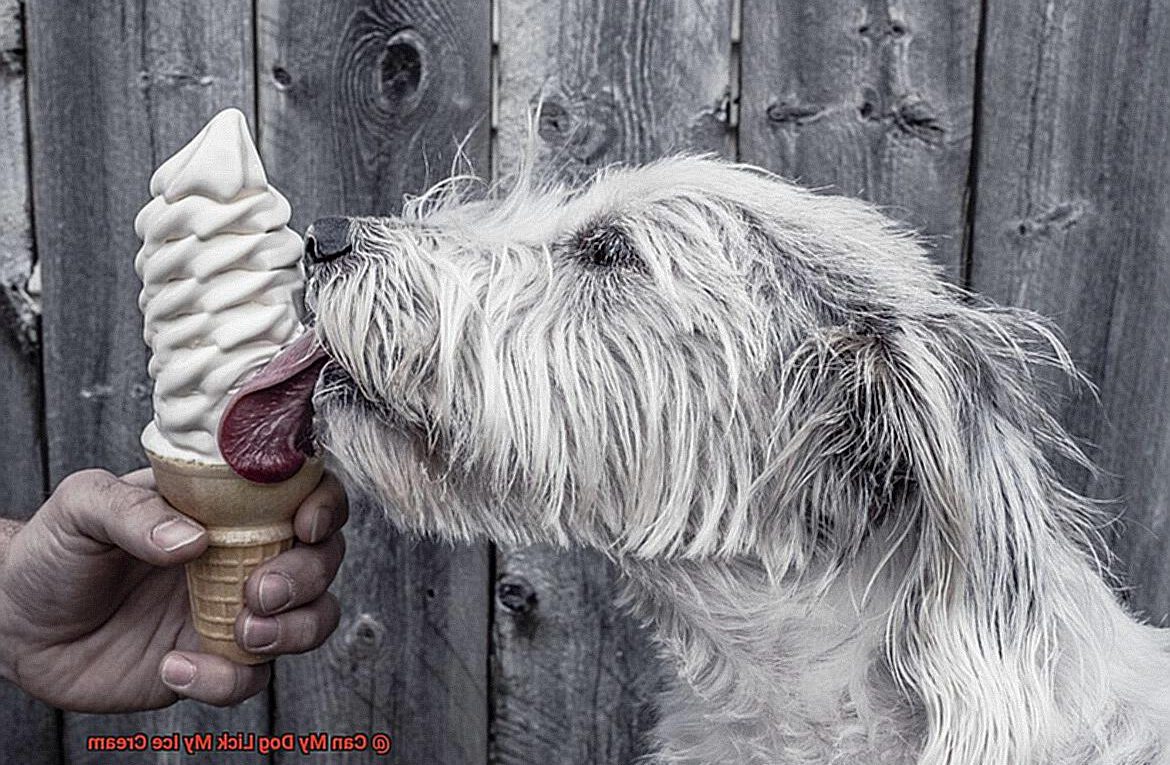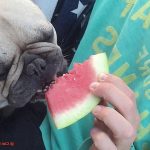Can My Dog Lick My Ice Cream?
Imagine this scene: It’s a scorching summer day, and you’re savoring a delectable ice cream cone that’s melting faster than you can say “lickety-split.” Meanwhile, your furry companion sits beside you, eyes locked on your frozen treat with an intensity that could rival the sun’s rays.
Now, here comes the million-dollar question: Can your dog lick your ice cream? While it may seem like harmless fun, there’s more to this dilemma than meets the eye. As someone who knows their way around canine care, I’m here to spill the scoop on the risks and benefits involved in this hotly debated topic.
We all know how much our four-legged friends adore treats. Their love for anything edible often leads to a relentless campaign of adorable begging. But is it safe to share your creamy delight with them? On one paw, allowing them a taste can bring sheer bliss to their furry faces.
On the other paw, there are potential health hazards lurking beneath that sweet surface – from minor tummy troubles to more serious complications.
In this blog post, we’ll delve into both sides of the ice cream-sharing coin. We’ll explore the perks and pitfalls of letting your pup indulge in a lick or two. Armed with this knowledge, you’ll be able to make an informed decision that ensures your furry friend stays happy and healthy.
So buckle up and prepare for a wild ride through the tantalizing world of ice cream sharing with our canine companions. Get ready as we dish out all the details on the risks and rewards that come with letting your dog have a taste of this beloved frozen delight.
The Potential Dangers of Letting Your Dog Lick Your Ice Cream
Contents
- 1 The Potential Dangers of Letting Your Dog Lick Your Ice Cream
- 2 Health Considerations for Dogs Who Eat Ice Cream
- 3 Hygiene Concerns Related to Letting Your Dog Lick Your Ice Cream
- 4 Establishing Boundaries and Teaching Good Manners
- 5 Alternatives to Letting Your Dog Lick Your Ice Cream
- 6 What Ingredients Should Be Avoided in Dog-Friendly Treats?
- 7 How To Find Safe and Nutritious Frozen Treats For Dogs
- 8 Conclusion
One tempting treat that many of us enjoy is ice cream. However, it’s important to be aware of the potential dangers that can arise from allowing your dog to lick your ice cream. In this blog post, we will explore the risks associated with this seemingly innocent act and provide insights to help you make informed decisions about your dog’s treat choices.
Health risks:
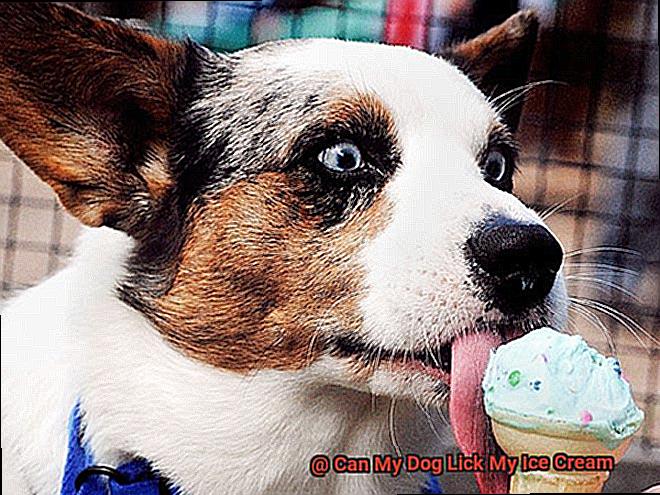
While a lick or two may seem harmless, it’s crucial to consider the health risks involved. Ice cream typically contains ingredients that can be harmful to dogs. For instance, sugar can lead to obesity and dental issues, while lactose can cause digestive upset in dogs that are lactose intolerant.
Moreover, artificial sweeteners like xylitol are extremely toxic to dogs and can even be fatal if ingested in large quantities.
Bacterial contamination:
Dogs have a knack for exploring their surroundings with their tongues, which means their mouths can harbor bacteria. When they lick your ice cream, these bacteria can be transferred to the treat, increasing the risk of contamination. Consuming contaminated ice cream can potentially lead to foodborne illnesses in humans.
Zoonotic diseases:
Zoonotic diseases are infections that can be transmitted between animals and humans. Dogs may carry pathogens like salmonella or campylobacter in their mouths. If they lick your ice cream, these pathogens can be passed on to humans, causing gastrointestinal distress or more severe complications, especially in individuals with weakened immune systems.
Allergic reactions:
Some individuals may have allergies or sensitivities to dog saliva. If a person with such allergies consumes ice cream that has been licked by a dog, they may experience allergic reactions ranging from itching and hives to swelling or difficulty breathing in severe cases.
Behavioral implications:
Allowing your dog to lick your ice cream can inadvertently reinforce certain behaviors. Dogs are quick learners and may associate ice cream with positive experiences if they are regularly allowed to lick it. This can lead to begging, food aggression, or even stealing food from humans. It is important to establish clear boundaries and not encourage such behaviors.
Conclusion:
While it may be tempting to share your ice cream with your beloved French bulldog, it’s essential to prioritize their health and well-being, as well as the safety of anyone who may consume the ice cream afterward.
Instead of risking potential dangers, consider treating your furry friend to dog-friendly ice cream or other safe and healthy alternatives. Remember, consulting with a veterinarian for personalized advice regarding your dog’s diet is always a wise choice.
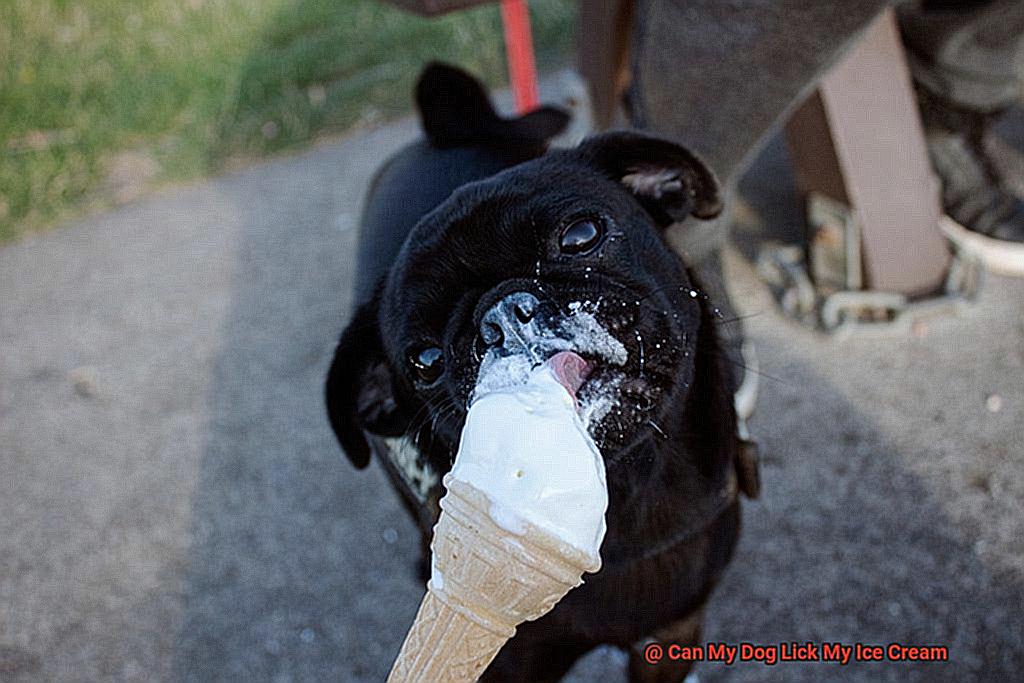
Health Considerations for Dogs Who Eat Ice Cream
French Bulldogs, with their adorable squishy faces and playful personalities, are a beloved breed among dog owners. But when it comes to their diet, it’s crucial to be mindful of their specific health considerations.
One common question that arises is whether French Bulldogs can safely indulge in the creamy delight of ice cream. In this article, we will explore the health considerations for French Bulldogs who eat ice cream and provide you with alternative options to keep your Frenchie happy and healthy.
- Lactose Intolerance: Ice cream contains lactose, a sugar found in milk products. Many dogs, including French Bulldogs, are lactose intolerant, meaning they lack the necessary enzyme, lactase, to break down lactose properly. Consuming ice cream can result in gastrointestinal issues such as diarrhea, vomiting, and gas for these pups. It’s best to avoid giving your Frenchie ice cream altogether to prevent any discomfort.
- High Sugar Content: Commercial ice creams are notorious for their high sugar content. Excessive sugar intake can lead to obesity, dental problems, and even diabetes in dogs. French Bulldogs are already prone to weight gain due to their stocky build, so it’s important to be mindful of their sugar intake and opt for healthier treats instead.
- Artificial Ingredients: Ice cream often contains artificial flavors, colors, and preservatives that can be problematic for French Bulldogs. These additives may trigger allergic reactions or other adverse effects in sensitive pups. Always read the ingredient list carefully and choose ice creams that use natural ingredients or consider making homemade frozen treats using safe ingredients like pureed fruits or vegetables.
- Xylitol: Some ice creams may contain xylitol, a sweetener commonly used in sugar-free products. Xylitol is highly toxic to dogs and can cause severe hypoglycemia and liver failure. It’s crucial to double-check the ingredients and ensure that any ice cream you give your Frenchie does not contain xylitol.
- Obesity: French Bulldogs are prone to weight gain, and regularly feeding them high-calorie treats like ice cream can exacerbate this issue. Obesity can lead to joint problems, heart disease, and a decreased lifespan. Instead, focus on providing a balanced diet and appropriate portion control to maintain a healthy weight for your Frenchie.
- Allergies and Sensitivities: French Bulldogs, like any other breed, can have allergies or sensitivities to specific ingredients commonly found in ice cream, such as dairy or certain flavors. If you notice any signs of an allergic reaction or digestive upset after your Frenchie consumes ice cream, consult with your veterinarian to determine the cause and appropriate course of action.
Hygiene Concerns Related to Letting Your Dog Lick Your Ice Cream
French Bulldogs are undoubtedly adorable, and it can be tempting to share a sweet treat like ice cream with them. However, there are several hygiene concerns that should be considered before letting your furry friend lick your ice cream. In this section, we will discuss these concerns in detail to ensure the health and well-being of both you and your French Bulldog.
Bacteria in Dogs’ Mouths
Contrary to popular belief, dogs’ mouths are not as clean as one might think. They harbor various types of bacteria, including potentially harmful ones like Salmonella and E. coli. When your French Bulldog licks your ice cream, these bacteria can be transferred to the treat.
Risk of Foodborne Illnesses
Consuming food contaminated with bacteria can lead to foodborne illnesses in humans. Symptoms may include nausea, vomiting, diarrhea, and abdominal pain. Certain individuals, such as the elderly, young children, and those with weakened immune systems, are more susceptible to these illnesses.
Zoonotic Diseases
Zoonotic diseases are illnesses that can be transmitted between animals and humans. French Bulldogs can carry certain zoonotic diseases in their saliva, such as Campylobacteriosis or Leptospirosis. Allowing your French Bulldog to lick your ice cream increases the risk of contracting these diseases.
Allergies and Sensitivities
Some individuals may have allergies or sensitivities to certain ingredients found in ice cream. When your French Bulldog licks the ice cream, traces of these ingredients can be transferred onto the treat. If a person with allergies consumes the ice cream, it may trigger an allergic reaction.
Personal Hygiene
Allowing your French Bulldog to lick your ice cream can also raise concerns about personal hygiene. The act of sharing food with your pet may introduce additional dirt, hair, or other contaminants into the treat.
Training Implications
Allowing a French Bulldog to lick food from your mouth or hands can reinforce undesirable behaviors such as begging or food aggression. It is important to establish boundaries and teach your French Bulldog appropriate behaviors around food.
Establishing Boundaries and Teaching Good Manners
French Bulldogs – those adorable little bundles of joy with their smushy faces and playful personalities. But let’s face it, they can also be mischievous when it comes to food. So how do we establish boundaries and teach good manners to prevent them from licking or stealing our delicious ice cream? Let’s dive in and find out.
- Consistent Rules: Just like with any training, consistency is key. Establish clear rules that certain areas, like the dining table or kitchen counter, are off-limits for your French Bulldog. Use verbal commands like “no” or “off” and reinforce them with positive reinforcement techniques such as treats or praise when your dog follows the command.
- The “Leave it” Command: Teaching your French Bulldog the “leave it” command is a valuable tool in preventing them from stealing your ice cream. Start by holding a treat in your hand and say “leave it.” When your dog stops trying to get the treat, reward them with a different treat or praise. Gradually increase the difficulty by placing the treat on the ground or even on a plate of ice cream, always using the “leave it” command.
- Consistency Among Family Members: Make sure all family members are on the same page when it comes to rules and commands. If one person allows your French Bulldog to lick their ice cream while others do not, it can be confusing for them. Consistency will help your furry friend understand what behaviors are expected of them.
- Supervision is Key: When enjoying that delicious frozen treat, keep it out of your French Bulldog’s reach or in a secure container. Avoid leaving ice cream unattended on tables or countertops where your dog can easily access it. Remember, prevention is better than cure.
- Training Sessions and Positive Reinforcement: Take advantage of training sessions to practice commands like “leave it” or “off” around tempting food items like ice cream. Reward your French Bulldog with treats, praise, or playtime when they demonstrate good behavior. Positive reinforcement will reinforce the idea that following the rules leads to positive outcomes.
- Managing the Environment: Store ice cream containers securely in the freezer and consider using baby gates or closed doors to restrict your French Bulldog’s access to certain areas where ice cream might be present. By managing their environment, you can prevent them from accessing ice cream when you’re not around.
- Stay Calm and Redirect: If your French Bulldog does manage to sneak a lick or steal a bite of your ice cream, stay calm and remove the ice cream. Redirect their attention elsewhere and provide them with an appropriate alternative to enjoy. Remember, harsh punishment can create fear or anxiety in dogs and may lead to negative behavior.
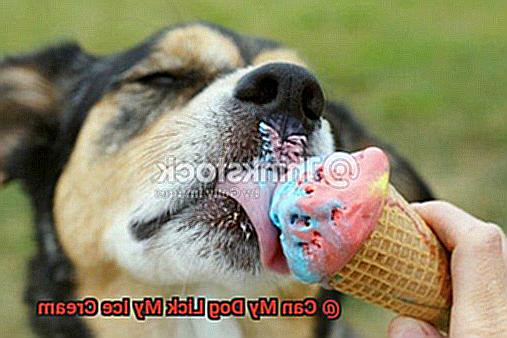
Alternatives to Letting Your Dog Lick Your Ice Cream

We all love treating ourselves to a delicious scoop of ice cream on a hot summer day. But when it comes to our furry friends, allowing them to join in on the ice cream fun can be risky. French Bulldogs, like many other breeds, are prone to health issues that can be exacerbated by indulging in ice cream.
Here, we’ll explore the safety risks associated with letting your dog lick your ice cream and provide alternative options that are both tasty and safe for your four-legged companion.
Why it’s not safe for French Bulldogs to lick ice cream:
- Harmful ingredients: Most commercially available ice creams contain ingredients that are toxic to dogs, such as chocolate, xylitol, and artificial sweeteners. These substances can lead to stomach upset, pancreatitis, and even life-threatening conditions.
- Digestive issues: Dogs’ digestive systems are not equipped to handle dairy products well. Consuming ice cream can result in gastrointestinal problems like diarrhea and vomiting.
- Reinforcing undesired behavior: Sharing ice cream with your dog can create a bad habit and reinforce begging or stealing food from your plate. It’s important to establish boundaries and train your dog not to engage in this behavior.
Alternatives to letting your dog lick ice cream:
- Frozen dog-friendly treats: Instead of sharing your ice cream, opt for frozen treats specifically designed for dogs. These treats are made with safe and healthy ingredients like plain yogurt, mashed fruits, and vegetables. They will satisfy your dog’s cravings while providing nutritional benefits.
- DIY frozen Kong toys: Create frozen Kong toys by stuffing them with dog-friendly foods like peanut butter, mashed bananas, or cooked meat. Freezing these toys will keep your dog entertained and provide a safe alternative to ice cream.
- Ice cream-like alternatives: Dog-friendly ice creams that mimic the texture and taste of traditional ice cream are available. These alternatives are typically made with ingredients like goat’s milk or coconut milk. They offer a frozen treat experience without the potential health risks.
- Training and boundaries: Establish clear boundaries and train your dog not to beg or attempt to lick your ice cream. Consistency is key, and redirecting their attention to their own treats or toys is crucial.
What Ingredients Should Be Avoided in Dog-Friendly Treats?
French Bulldogs are known for their unique personalities and lovable charm. As a French Bulldog owner, it’s essential to be mindful of the ingredients in dog-friendly treats to ensure your furry friend stays happy and healthy. Here are some key ingredients to avoid:
- Chocolate: While we humans may find chocolate irresistible, it contains theobromine, which is toxic to dogs. Even small amounts can lead to symptoms like vomiting, diarrhea, rapid breathing, and seizures. So, no sneaking a piece of that delicious chocolate bar to your pup.
- Xylitol: This artificial sweetener is commonly found in sugar-free products like gum and candy. It can cause a rapid release of insulin in dogs, leading to dangerously low blood sugar levels. Signs of xylitol poisoning include vomiting, loss of coordination, and seizures. Keep an eye out for this ingredient on labels.
- Grapes and Raisins: These fruits may seem harmless, but they can actually cause kidney failure in dogs, even in small amounts. Symptoms may include lethargy, decreased appetite, and increased thirst and urination. So, let’s skip the grape-infused treats for our Frenchies.
- Onions and Garlic: These flavorful ingredients can add a tasty punch to our meals, but they contain compounds that can damage a dog’s red blood cells, leading to anemia. Symptoms of onion or garlic toxicity include weakness, pale gums, and dark-colored urine.
- Dairy Products: While many of us enjoy a bowl of ice cream as a special treat, most dogs are lactose intolerant and cannot properly digest lactose. This can lead to digestive upset like diarrhea or bloating. It’s best to avoid giving your French Bulldog dairy-based treats.
- Artificial Preservatives and Additives: Ingredients like BHA (butylated hydroxyanisole) and BHT (butylated hydroxytoluene) are commonly used as preservatives in dog treats. However, these chemicals have been linked to various health issues in dogs, including liver and kidney damage. Opt for treats without these additives.
How To Find Safe and Nutritious Frozen Treats For Dogs
Dogs are known for their love of food and their curious nature, so it’s not uncommon for them to try and lick anything that catches their attention, including ice cream. However, while it may seem harmless and cute to let your dog lick your ice cream, there are some important factors to consider before allowing this behavior.
One of the main concerns is that ice cream contains ingredients that can be harmful to dogs. Most ice creams contain dairy products, which can cause digestive issues such as upset stomach, diarrhea, or even lactose intolerance in dogs.
Additionally, many ice creams are loaded with sugar and artificial sweeteners, which can lead to weight gain, dental problems, and even diabetes in dogs.
Another potential danger is the presence of chocolate or xylitol in certain flavors of ice cream. Both chocolate and xylitol are toxic to dogs and can cause serious health issues if ingested. Chocolate can lead to symptoms like vomiting, increased heart rate, and even seizures or death in severe cases. Xylitol, commonly found in sugar-free ice creams, can cause a rapid drop in blood sugar levels and lead to liver failure.
It’s also important to consider the hygiene aspect of letting your dog lick your ice cream. Dogs tend to carry bacteria in their mouths, which can be transferred to the ice cream and potentially make you sick if consumed.
Additionally, allowing your dog to lick your ice cream can reinforce undesirable behaviors such as begging or stealing food. It’s important to establish boundaries and teach your dog good manners when it comes to food.
If you still want to share a treat with your furry friend, there are dog-friendly alternatives available. There are specifically formulated frozen treats for dogs that are made with safe ingredients and flavors that cater to their dietary needs.
These treats are often made with dog-friendly ingredients like yogurt, fruit, or even vegetables. They are free from harmful additives and are designed to be a safe and nutritious option for dogs.
Conclusion
In conclusion, it is generally safe for your dog to lick your ice cream, but there are some factors to consider.
While a little lick here and there may not cause harm, it’s important to remember that dogs have different dietary needs than humans. Some ingredients commonly found in ice cream, such as chocolate or artificial sweeteners like xylitol, can be toxic to dogs.
Additionally, the cold temperature of ice cream can sometimes cause discomfort or even brain freeze for your furry friend. It’s always best to err on the side of caution and avoid sharing your ice cream with your dog.
Instead, opt for dog-friendly frozen treats specifically made for their consumption.
